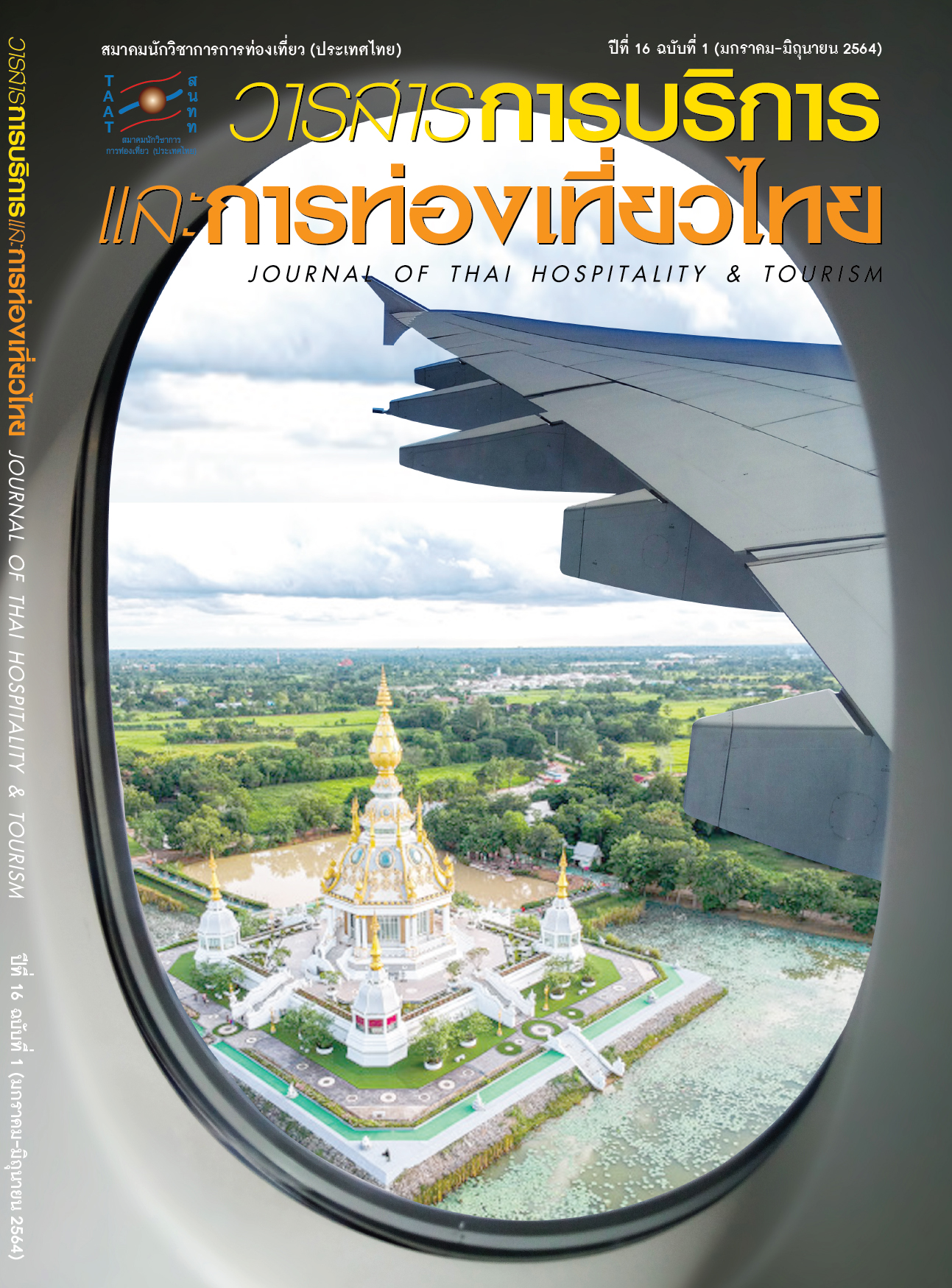ความต้องการจำเป็นด้านทักษะการสื่อสารภาษาอังกฤษของพนักงานต้อนรับส่วนหน้า
Main Article Content
บทคัดย่อ
ทักษะที่สำคัญอันหนึ่งที่ผู้ทำงานในภาคส่วนการท่องเที่ยวและการโรงแรมจำเป็นต้องมี คือ ทักษะการสื่อสารภาษาอังกฤษอย่างมีประสิทธิภาพ ทักษะดังกล่าวเป็นที่ต้องการอย่างมากสำหรับพนักงานต้อนรับในโรงแรม ดังนั้นวัตถุประสงค์ในการศึกษาวิจัยครั้งนี้ คือ เพื่อระบุถึงความต้องการจำเป็นของทักษะภาษาอังกฤษเพื่อใช้ในการสื่อสารสำหรับพนักงานต้อนรับในโรงแรมในจังหวัดอุบลราชธานี เครื่องมือที่ใช้ในการวิจัยได้แก่ แบบประเมินตนเอง แบบสอบถามความคิดเห็น แบบสำรวจความต้องการจำเป็น และการสัมภาษณ์แบบกึ่งโครงสร้าง ประชากรกลุ่มตัวอย่างได้แก่ พนักงานต้อนรับส่วนหน้าจำนวน 16 คน ลูกค้าชาวต่างชาติจำนวน 16 คน และผู้จัดการโรงแรมจำนวน 10 คน ที่ทำงานหรือพักอาศัยในโรงแรมหรือที่พักแรมในจังหวัดอุบลราชธานี ผลการวิจัยแสดงให้เห็นว่า พนักงานต้อนรับส่วนหน้าจำเป็นต้องพัฒนาทักษะการฟังภาษาอังกฤษในกิจกรรมต่อไปนี้ 1) การฟังและเข้าใจถึงความต้องการของลูกค้า 2) การเข้าใจสำเนียงภาษาอังกฤษที่ต่างกันของลูกค้า 3) การเข้าใจข้อมูลและรายละเอียดส่วนตัวของลูกค้า 4) การฟังและสามารถช่วยแก้ปัญหาของลูกค้าได้ ในส่วนของทักษะการพูดภาษาอังกฤษ พนักงานต้อนรับส่วนหน้าจำเป็นต้องพัฒนา 1) การกล่าวต้อนรับและทักทายลูกค้าชาวต่างชาติอย่างเหมาะสม 2) การให้ข้อมูลเกี่ยวกับรายละเอียดห้องพักและสิ่งอำนวยความสะดวก 3) การแนะนำข้อมูลเกี่ยวกับสถานที่ท่องเที่ยว และ 4) การแนะนำอาหารท้องถิ่นบริเวณใกล้เคียง
Article Details
เอกสารอ้างอิง
Anongnart Fahmongkolchai. (2011). Needs and Problem in English Listening and Speaking Skills of CIMB Thai Bank Teller. Unpublished Paper, Srinakharinwirot University.
Chan, M. Y. (2002). English in Kuala Lumpur. In Mukundan, J., Samad, A. A. & Teh, C. S. (Eds.), Readings in English Language Teaching (ELT): Selected Papers from the Millenium MICELT (pp. 35–44). Serdang, Malaysia: Penerbit Universiti Putra Malaysia.
Kamonwan Charunsri. (2011). The Needs and Problems of English Language Skills for the Hotel Front Office Staff in Chinatown. Unpublished Paper, Thammasat University.
Lu, C., Berchoux, C., Marex, M. W. & Chen, B. (2015). Service Quality and Customer Satisfaction: Qualitative Research Implications for Luxury Hotels. International Journal of Culture, Tourism and Hospitality Research, 9(2), 168–182.
Mehrabian, A. (2007). Nonverbal Communication. New Brunswick, NJ: Aldine Transaction.
Nawamin Prachanant. (2012). Needs Analysis of English Language Use in the Tourism Industry. Social and Behavioral Sciences, 66, 117–125.
Penhold, P. (2014). Tourism and Hospitality Studies: Customer Relations and Service: Introduction to Customer Relations and Services. Education Bureau.
Richards, J. C. (2000). New Interchange: English for International Communications. Cambridge University Press.
Sarintorn Pongjumpa. (2011). A Survey of the Needs of English Proficiency of Five–Star Hotels’ Staff and Representatives in Bangkok the Aspect of Needs Referring to Hotel English and General English. Unpublished Paper, Thammasat University.
Supaporn Sereerat, Songkoon Chantachon & Sastra Lao–akka. (2015). Integration of Art and Culture to Develop Hotel Business in North-Eastern Thailand. Asia Pacific Journal of Multidisciplinary Research, 3(3), 16–19.
Tanner, J. & Raymond, M. A. (2010). Principles of Marketing. Retrieved March 28, 2018, from http://
books.lardbucket.org/pdfs/marketing–principles–v1.0.pdf
Wachiraporn Kijpoonphol, Linh, N. D. & Jindapa Thonglong. (2018). Communication Problems between Front Office Staff and Non-Thai Guests. In the 2nd Work Integrated Learning National Conference: Employability and Engagement Proceedings (pp. 298–310). Walailuk University.
Wilson, A., Zeithaml, V. A., Biner, M. J. & Gremier, D. D. (2008). Services Marketing: Integrating Customer Focus across the Firm. 3rd ed. London: McGraw–Hill.


